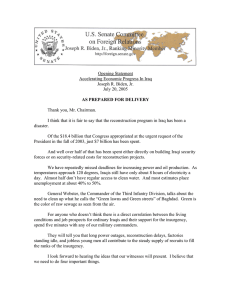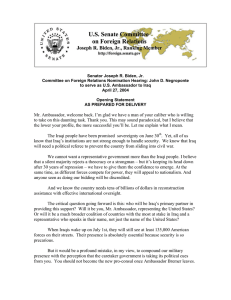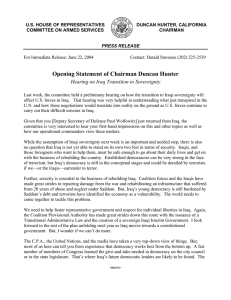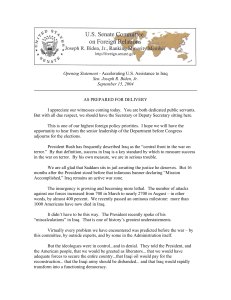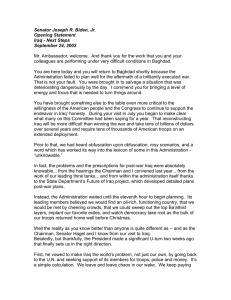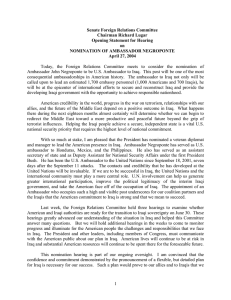Senate Foreign Relations Committee Chairman Richard Lugar Opening Statement for Hearing on
advertisement
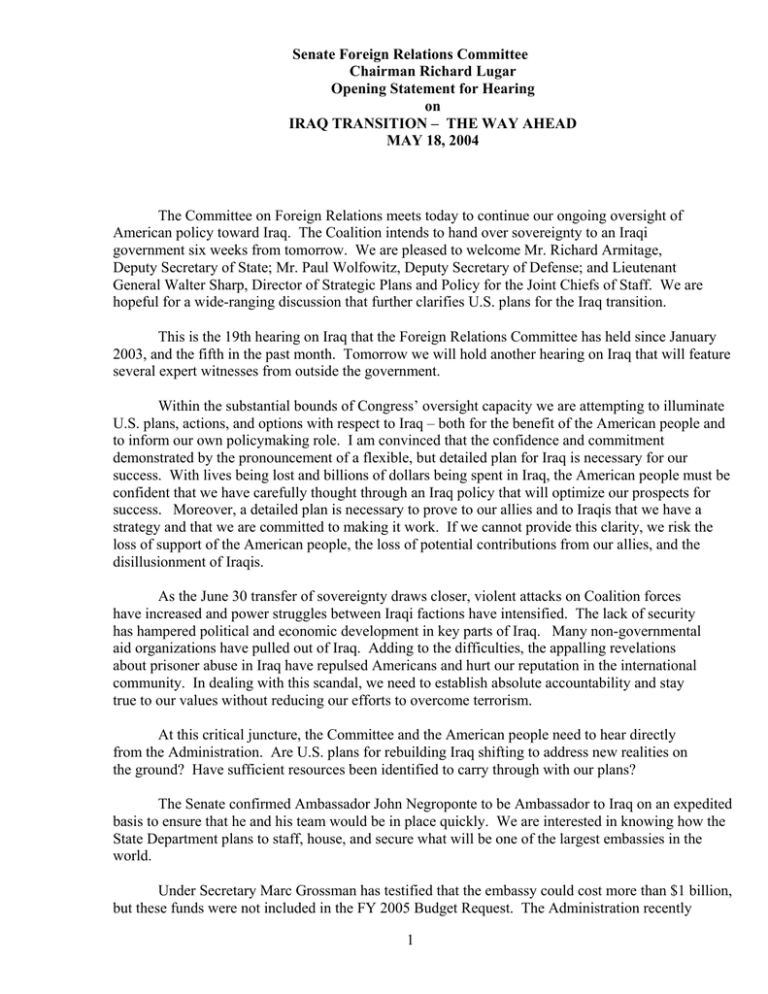
Senate Foreign Relations Committee Chairman Richard Lugar Opening Statement for Hearing on IRAQ TRANSITION – THE WAY AHEAD MAY 18, 2004 The Committee on Foreign Relations meets today to continue our ongoing oversight of American policy toward Iraq. The Coalition intends to hand over sovereignty to an Iraqi government six weeks from tomorrow. We are pleased to welcome Mr. Richard Armitage, Deputy Secretary of State; Mr. Paul Wolfowitz, Deputy Secretary of Defense; and Lieutenant General Walter Sharp, Director of Strategic Plans and Policy for the Joint Chiefs of Staff. We are hopeful for a wide-ranging discussion that further clarifies U.S. plans for the Iraq transition. This is the 19th hearing on Iraq that the Foreign Relations Committee has held since January 2003, and the fifth in the past month. Tomorrow we will hold another hearing on Iraq that will feature several expert witnesses from outside the government. Within the substantial bounds of Congress’ oversight capacity we are attempting to illuminate U.S. plans, actions, and options with respect to Iraq – both for the benefit of the American people and to inform our own policymaking role. I am convinced that the confidence and commitment demonstrated by the pronouncement of a flexible, but detailed plan for Iraq is necessary for our success. With lives being lost and billions of dollars being spent in Iraq, the American people must be confident that we have carefully thought through an Iraq policy that will optimize our prospects for success. Moreover, a detailed plan is necessary to prove to our allies and to Iraqis that we have a strategy and that we are committed to making it work. If we cannot provide this clarity, we risk the loss of support of the American people, the loss of potential contributions from our allies, and the disillusionment of Iraqis. As the June 30 transfer of sovereignty draws closer, violent attacks on Coalition forces have increased and power struggles between Iraqi factions have intensified. The lack of security has hampered political and economic development in key parts of Iraq. Many non-governmental aid organizations have pulled out of Iraq. Adding to the difficulties, the appalling revelations about prisoner abuse in Iraq have repulsed Americans and hurt our reputation in the international community. In dealing with this scandal, we need to establish absolute accountability and stay true to our values without reducing our efforts to overcome terrorism. At this critical juncture, the Committee and the American people need to hear directly from the Administration. Are U.S. plans for rebuilding Iraq shifting to address new realities on the ground? Have sufficient resources been identified to carry through with our plans? The Senate confirmed Ambassador John Negroponte to be Ambassador to Iraq on an expedited basis to ensure that he and his team would be in place quickly. We are interested in knowing how the State Department plans to staff, house, and secure what will be one of the largest embassies in the world. Under Secretary Marc Grossman has testified that the embassy could cost more than $1 billion, but these funds were not included in the FY 2005 Budget Request. The Administration recently 1 requested an additional $25 billion in contingency funds for Iraq and Afghanistan, but this amount does not include any funding for the new Embassy. Our diplomatic forces as well as our military forces must have what they need to succeed. I am especially interested in details surrounding the use of the $18.4 billion provided for Iraq by the Emergency Supplemental signed November 6, 2003. In this bill, Congress gave broad authority to the President to control these funds through the Office of Management and Budget. The OMB report submitted last month showed that only $2.3 billion of the $18.4 billion had been obligated by March 24, 2004. Given the urgency of reconstruction efforts in Iraq and the role that they play in a successful outcome for the United States, it is perplexing that only about 12 percent of this money had been obligated. Committee inquiries indicate that reconstruction projects have been slowed by a long, bureaucratic contracting process overseen by OMB and DOD. In addition, the OMB report lacks specificity. In many cases, the report fails even to identify the agency responsible for carrying out reconstruction projects. Our Committee needs to be reassured that Congress’ intent is being fulfilled and that there is no unnecessary delay in reconstruction efforts. In Iraq we are perceived more as an occupation force than as a friend helping to nurture a new nation. Delays in reconstruction undercut U.S. credibility and increase suspicions among Iraqis who are impatient for improvements. Without tangible progress in reconstruction, Iraqis will perceive little benefit in the U.S. military presence. Achieving a transfer of sovereignty on June 30, 2004, was always going to stretch our capabilities. But since we are firmly committed to that date, we should be attempting to accelerate stabilization and reconstruction in every way possible. We are hopeful that Ambassador Lakhdar Brahimi will be successful in his work to construct an interim Iraqi government. The Iraqis themselves must reach internal political consensus and balance competing Sunni, Shia, and Kurdish factions. Once the new government is named, the transition to sovereignty should begin immediately. If possible, we should establish the U.S. Embassy before the June 30 transfer and bring Ambassador Negroponte in early. Ambassador Bremer has provided extraordinary service, but at this stage, he will begin to take on lame duck status. Undersecretary Grossman testified on April 22nd about the importance of engaging the interim Iraqi government as soon as it is selected. We cannot simply turn on the lights at the Embassy on June 30 and expect everything to go well. We must be rehearsing with Iraqi authorities and our Coalition partners how decision-making and administrative power will be distributed and exercised. It is critical, therefore, that Ambassador Negroponte and his team be put in place at the earliest possible moment. We also should be accelerating negotiations to complete a United Nations Security Council resolution to give international legitimacy to the new Iraqi government and to define new security arrangements. In addition, the United Nations and the new interim government should consider accelerating the elections scheduled for January 2005 and December 2005 for the Transitional and Permanent Iraqi governments. We thank our witnesses for joining us, and we look forward to the details and insights that they will provide. ### 2
